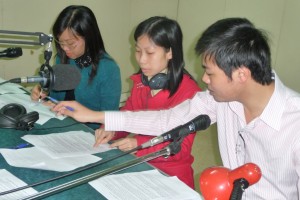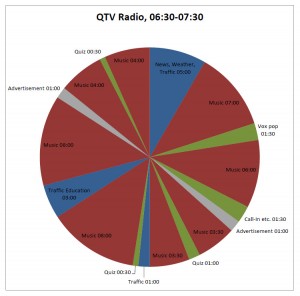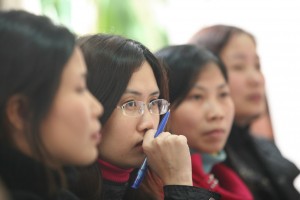Producing “Radio for the People” in Vietnam
 Radio listeners in Northern Vietnam’s Quang Ninh Province probably didn’t know what hit them earlier this year. Instead of drab propaganda programs, the radio was playing popular music interspersed with traffic information and listeners’ calls. And this new show was presented by a friendly host who was talking to the listeners at eye level. So far, radio hosts had sounded more like talking machines who thought it necessary to instruct the audience what to think.
Radio listeners in Northern Vietnam’s Quang Ninh Province probably didn’t know what hit them earlier this year. Instead of drab propaganda programs, the radio was playing popular music interspersed with traffic information and listeners’ calls. And this new show was presented by a friendly host who was talking to the listeners at eye level. So far, radio hosts had sounded more like talking machines who thought it necessary to instruct the audience what to think.
The program the listeners of QTV radio in Quang Ninh Province were hearing was “Rush Hour”, a one-hour morning show that the station had just started with the help of DW-AKADEMIE, Friedrich-Ebert Foundation and Vietnam’s Academy of Journalism and Communication.
The idea behind the show may sound simple, yet it was pretty new for Vietnam: Producing radio programs with the listeners in mind. So far, radio producers had mostly just broadcast the views and policies of the authorities – pure propaganda. This kind of radio may have worked until a few decades ago, but in competition with television and the Internet, the radio station had lost more and more of its listeners.
In the end, some people in the province didn’t even know that QTV radio was still on the air.
Audience research conducted by Vietnam’s Academy for Journalism and Communication at the beginning of 2011 confirmed this dismal response from the audience. It showed that radio basically didn’t play a role in people’s lives any more.
The young crew at QTV radio was devastated. No one was listening to their programs. Their work was in vain.
And the authorities weren’t happy either, because they weren’t getting their message across to the people of the province. Something had to change. But what? And how?
The remedy that trainers from DW-AKADEMIE suggested seemed shocking at first: Play music! Play a lot of music. Dare to be funny. And give your audience a say on the air.
Your chances of getting information across are better if you package it in a way that the listeners will actually want to hear. So keep the text parts short, be entertaining and informative and take your listeners seriously. Don’t treat them like little children who must be told what to think and do. They are critical human beings, individuals. And they have the power to turn the radio on or off – depending on whether they like what they hear.
 Taking these ideas as their cue, the European trainers and the QTV radio staff developed the structure for a new morning program containing popular music, information and audience participation elements. And since both sides contributed their ideas, the product was a synthesis of Western expertise and Asian knowledge about local listeners’ habits, values and culture.
Taking these ideas as their cue, the European trainers and the QTV radio staff developed the structure for a new morning program containing popular music, information and audience participation elements. And since both sides contributed their ideas, the product was a synthesis of Western expertise and Asian knowledge about local listeners’ habits, values and culture.
“Rush Hour” broadcast daily
The new morning show “Rush Hour” has been on the air since May. It’s on from 6.30 to 7.30 every morning. Prime time. It became an instant success, something people talk about in the streets.
Audience research conducted since then has shown that almost all listeners prefer the new radio format over the old style of dreary propaganda radio. The figures were staggering: 200 out of the 202 people tested in a representative sample said they liked the new format better.
For the QTV radio staff, this triumph was a well-earned reward for their hard work. It has given them new self-confidence. And it has strengthened their position within the broadcasting institution.
What’s also good for the radio journalists is that their bosses are fully behind the project. At the end of June, QTV invited local authorities and businesspeople to the radio station for a presentation of the new program. The aim of the meeting was to drum up support for the show. QTV showed them the television presentation you can watch below. We’ve added a rough translation for those who don’t understand Vietnamese. If you’re having trouble watching the video here or can’t see the English summary, you can always visit our Asia blog’s YouTube channel.
http://www.youtube.com/watch?v=ZoZJGSyyeFU?t=4s
The presentation went extremely well for the “Rush Hour” producers: The guests agreed to contribute to the programs – either financially or by providing content. Local bus drivers and taxi companies, for instance, pledged to call in and report traffic jams and accidents whenever they encountered them. This will help QTV Rush Hour get traffic information on the air even from parts of the province where the station doesn’t have stringers.
Relaunching the morning and afternoon prime time
The next steps for QTV are to expand the new style of programming. The station wants to launch a daily two-hour call-in show during the afternoon rush hour. That’s what the station’s radio staff and the DW-AKADEMIE trainers are working on this month.
Once the new afternoon show goes on the air in September, both the morning and the evening prime time slots will have a completely new sound: More listener-oriented, more entertaining, with more information and less indoctrination.
This success was only possible because everyone involved contributed their share: the AJC researchers testing what local Vietnamese audiences expected from a radio station, the QTV leadership and staff who fully backed the project and invested a great deal of time and energy and the German institutions that supported the project financially, logistically and with their expertise.
What’s ahead for 2012? That’s up to the partners to negotiate. DW-AKADEMIE is hoping that it will be able to assist QTV in reforming the rest of its radio programs in the interest of the listeners. A real “Radio for the People”.




